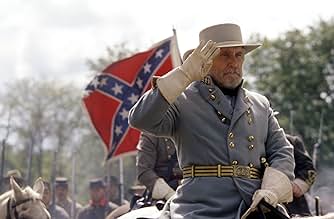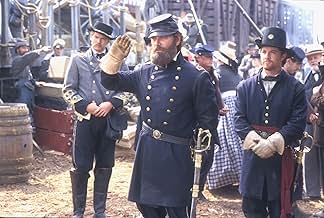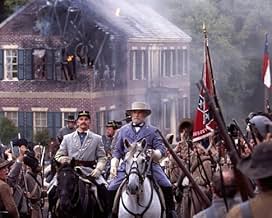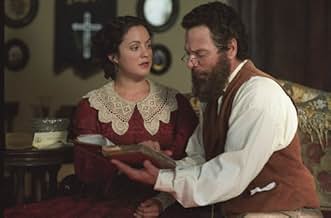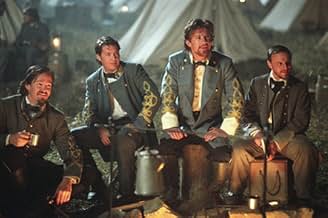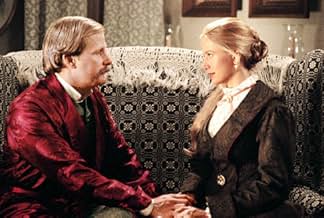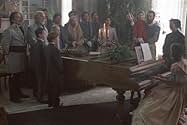Ajouter une intrigue dans votre langueThe rise and fall of confederate general Thomas "Stonewall" Jackson, as he meets with military success against the Union from 1861 to 1863, when he is accidentally killed by his own soldiers... Tout lireThe rise and fall of confederate general Thomas "Stonewall" Jackson, as he meets with military success against the Union from 1861 to 1863, when he is accidentally killed by his own soldiers.The rise and fall of confederate general Thomas "Stonewall" Jackson, as he meets with military success against the Union from 1861 to 1863, when he is accidentally killed by his own soldiers.
- Réalisation
- Scénario
- Casting principal
- Récompenses
- 1 victoire et 4 nominations au total
- Gen. James Kemper
- (as Royce Applegate)
- Confederate General
- (as Robert C. Byrd)
Avis à la une
I remember reading about the Director's Cut on the old IMDb forums, they said the theater version left major important parts. Add those back in, and it clicks.
With the missing parts in, it's almost as good as Gettysburg, and Stephen Lang's "Sappy Stonewall" is much less irritating. In the theater we were counting the minutes until the next cry, and coughing to wake up the snoring history buffs all around us.
Ps I miss those forums. For things like this alone, they were gold.
Instead of focusing on the main character, his background, why he was a truly great and complicated man, we're constantly distracted from him by many, many different plots. Jeff Daniel's Chamberlain, as seen in the previous movie, multiple unnamed union and confederate soldiers, townsfolk, lots of backstory of Robert E Lee, even John Wilkes Booth is portrayed, for some reason, for extended periods of time. All this time spent on story lines makes the viewer feel alienated and confused any time our main character, Stonewall appears, and we think, "Wait...who was this guy again?"
Jackson was indeed a fascinating character, probably the most fascinating of any of the confederates. He was modest weirdo of a man, employed as a professor at a military school, and was much despised by his students and fellow faculty because of his ineptitude as a teacher. He showed no sign of greatness, or even competence, whatsoever, before the war. He also seems to be a genuinely good man at heart, unconcerned with the conventions of the south aside from his ardent, zealous, devotion to Christianity. He created a bible school for slaves, teaching them to read, and the only slaves he owned were those he met through this, who actually came to him and requested that he buy them, knowing they'd be well treated under his roof. He was unconcerned with the politics of the war, and had always been against the notion of it. He fought for the confederacy simply because Virginia was his home, and that's what side it was on; which was the sole reason many other confederates fought.
What made him famous, however, was not his good nature but his absolute brutality, his single minded devotion to making his war as horrible and unpalatable to both sides of the conflict, in order, in his eyes, to reach the most humane goal of ending it quickly. Something dark and cold seemed to awaken in him, transforming this strange little professor into a rabid, brutal taskmaster of a general who saw men as merely a resource to expend in order to reach his next objective, which was always his sole concern. He forced march his men to death and starvation many times, in fact with regularity so, he constantly quarreled with his subordinates, court-martialing them for any perceived offense, openly admonishing their character and abilities, and he was an ardent believer in the "Black Flag," meaning no quarter for the enemy, all prisoners executed, no restraint shown in any way towards northern civilians (or even southern ones if necessary) or soldiers. He saw it as his godly duty to rampage, to show those who wished to see just what war was, and make them reconsider.
The film touches on the duality of the man, though very scarcely, very incompletely. It portrays him as basically a very good man, who just happened to be a successful general. When in reality he had become a deadly, horribly efficient destroyer of men, who just happened to be a very agreeable, if somewhat eccentric, good person at heart. The film, of course, doesn't get much into that dark side of him, which is shame because it's really the soul of the story, and we're left with a basic question that is never answered: why are we even watching this? What's interesting about him? Why are we watching a four and half hour long movie about this ultra-christian dork?
Of other note, Robert Duvall is pretty mediocre in is role as Robert E. lee, he resembles the real person more than Martin Sheen did, but lacks the command, the gravitas the later possessed. The film also has some of the absolute worst CGI scenes I've ever seen. In general ,the Battle scenes are more well done than Gettysburg, it does a much better job at depicted the massed numbers of men involved as opposed to the previous movie which seems to show Pickett's last charge as a couple hundred dudes marching through the field as opposed to the ten thousand or so it was in reality.
But at the end of it all, after watching this movie many times over the years, I'm left scratching my head, and trying to figured out: what story was it they were trying to tell here?
What I liked about the movie: I thought Lang did an excellent job portraying Jackson. I was deeply moved by his final scene in the film.
The attention to detail was good; overall it was historically accurate--with some exceptions.
The costumes looked good.
I appreciated the show of how Christianity influenced many in the Civil War, such as Jackson and Lee.
I liked the fact that many from Gettysburg reprised their roles in this film, although there were some who couldn't, which was a little disappointing.
What I didn't like or wished was better about the movie: The fake beards were more than obvious in this film, with the exception of Jackson's and Lee's, but this is relatively minor to the overall film.
I thought, with maybe the exception of the Fredericksburg battle, the depiction of the battle scenes were not nearly as well done as in Gettysburg; but to be fair, there were more battles to cover in this film. Gettysburg only had one, meaning more time could be given to the details of the battle.
The battle of Antietam was not in the movie at all, not even mentioned, which is very disappointing given its significance and effects.
Some of the CGI is poorly done (i.e., very obvious), but, again, this is a small part of the movie and in my opinion neither makes nor breaks it.
Some of the speeches were a bit stiff and seemed contrived, particularly Chamberlain's speech before the battle of Fredricksburg.
Not enough time was given to developing the characters of Lee, Chamberlain, and Hancock, all of whom are important in the novel. In fact, in contrast to the film, the novel gives most time to Lee, not Jackson. To be fair, however, novels usually are better than their film counterparts given the constraints of time.
My thoughts on some of the common complaints about the movie: Some complain there wasn't enough realism as to the carnage of war. To that I say there was enough to get the point across, and for myself, it is refreshing from time to time to see a movie that doesn't rely too heavily on blood and guts. This is not meant to be a blood and guts movie. The novel is even less bloody. Anyone who wants to see a blood and guts war movie should buy or rent Saving Private Ryan, Full Metal Jacket, Hamburger Hill, the Patriot, Braveheart, etc.
Others complain that there were too many poetic speeches. Indeed there were many speeches, but that was also true of Gettysburg, which most view as a good movie. I didn't mind the speeches so much other than they sometimes truncated the character in such a way that the audience fails to see their visceral humanity. As stated above, the only speech I thought was a bit over the top was Chamberlain's before the battle of Fredricksburg. It seemed forced, showy, and odd that the whole regiment would stand motionless and quiet for so long to hear him go on and on. Clearly it was intended to be a poignant moment showing historical parallels between the American Civil War and Roman history. But the whole scene ends up feeling staged and apathetic.
Others complain about the strong emphasis on religion. As stated above, I found this emphasis refreshing, for certainly Jackson and Lee were very devout Christian men. Christianity was a part of the ethos of this country at that time and affected many in both north and south.
Still others complain about the pro-southern perspective being so strong. While I admit there is an imbalance between the northern and southern perspectives, which clearly favors the southern view, I also think this only stands to reason, since the overall focus of the film is clearly on Jackson, a southerner. And given the fact that many other movies often underplay the southern perspective (i.e., it was fought over State's rights) or ignore it altogether, some will find this movie's emphasis a refreshing change. On the other hand, the clear downplay of the role and effect of slavery in this film will no doubt trouble many Americans.
Finally, others complain that the movie is too long. But I find this to be a misnomer. What most really mean by this is that the movie is not entertaining enough to justify such a length. This is not the first long film in cinematic history. Other films were very long and yet praised as wonderful (Terms of Endearment, Dances With Wolves, Gone with the Wind, Braveheart, Lord of the Rings, etc.). The real issue here, I believe, is that this movie for many is too "slow" or "mundane" in their estimation. This, I think, is a result of our becoming so accustomed to roller coaster rides at the movies. If it isn't constantly exciting or humorous or action-packed, it needs to be short. I suppose that in a TV age wherein we are accustom to pure entertainment compacted into ten-minute blocks of time separated by pithy, entertaining commercials, this complaint ought not surprise us, given the historical orientation of this film. But I think such a complaint is evidence of a deeper cultural problem, which should concern us all.
My opinion who will like this movie: many Historians, Teachers, and Homeschooling parents; most southerners; Civil War reenactors; many Christians.
My opinion who will not like this movie: Most northerners, most African Americans, many Liberals, most in Hollywood.
My opinion on how the movie will fare: It will likely not last long in the theaters. Most critics will hate it. It will come out on DVD/Home video sooner than most movies. It will likely not rake in as much money as it cost to make. However, I hope to be proven wrong here. Though not without flaws, I believe it is worth seeing and discussing.
The reverence shown to Generals Jackson and Lee is usually reserved for biblical figures. It made me wonder if "Gods and Generals" captures the way people of that time really spoke?
Maybe formal address was more common in the 1860's, but just about everything anyone says in the first hour and a half is a speech. Before the brilliantly staged Battle of Fredericksburg, Jeff Daniels even recites an ancient poem, "The Crossing of the Rubicon".
I'm sure the dialogue has been shaped from historic records and especially letters, but people don't necessarily speak the way they write; some of the exchanges between husbands and wives, and mothers and sons in this film are bizarre. The frequent appearances of John Wilkes Booth ever ready with a Shakespearean soliloquy add to the theatricality.
Some may object to a comparison with "Gone with the Wind'. However it has far more natural speech patterns than "Gods and Generals" and in 1939, when it was released, there were still some thousands of veterans of the war still alive, albeit elderly.
Heightening the dolefulness of "Gods and Generals" is the score. Other than source music from bands and soldiers singing, pathos informs nearly every theme whether for an intimate interior or a horizon-wide battle. To be fair, the theme for the surprise attack at Chancellorsville, "VMI Will Be Heard From Today", shows how the rest of the score could have been coloured differently.
Possibly the filmmakers didn't want to glorify war by building the score around the stirring anthems and songs of the Civil War, but it's a classic example of how music can shape the mood of a film.
For a while it seemed that slavery was receiving a pass, but towards the end, Jeff Daniel's Joshua Chamberlain puts it into context.
"Gods and Generals" does too much. Surely John Wilkes could have been saved for another movie. However the look of the film is amazing. We are transported to those battlefields; each one different, although we are spared what a blast of grapeshot would actually do to a human body.
In the end, those authentic looking re-creations of suicidal advances and troops firing point blank volleys into each other can only leave the impression that it was an era that produced remarkably brave soldiers.
I can go on and on, but for me, it falls apart with the sophomoric writing. I counted at least a dozen instances where they shoehorned in actual quotes from these historical figures into places where they made no sense. They even have characters steal each other's quotes which made me LOL hard a few times. Its distracting!
In fact, this entire script is just one scene after another which are structured around famous quotes. The worst example is JEB Stuart, quite literally out of no where, ending a scene with Stonewall Jackson saying "Oh by the way (even though this is very off topic and you did not ask), I will always tell my men to gallop toward the enemy, and trot away". Its stuff like that which makes this movie unbearable, especially when compared to Gettysburg, which had "some" of that but was balanced out by actual character arcs, impressive direction of masses of reenactors, and an A list cast which acted that entire film masterfully, e.g. Sheen, Berringer, Lang, and especially Richard Jordan r.i.p. Gettysburg was able to masterfully (probably in editing phase) take situations before and during the battle to shape a properly structured, easy to follow story despite there being 50+ main characters.
Gods and Generals is just a mess, the complete opposite. I totally understand the propensity for civil war buffs (like myself) to give this a high score (look how many 10 stars skew the results), but, I say quite literally the opposite, because we're civil war buffs we deserve a better film that isn't a mess.
10/10 stars? Is this as good as Glory? Gone with the Wind? Or even Cold Mountain?
Le saviez-vous
- AnecdotesSome scenes were filmed on Robert Duvall's estate in Virginia, which was the site of some Civil War skirmishes.
- GaffesRobert Edward Lee and Thomas Jonathan Jackson are shown wearing full beards at the very start of the Civil War, but they did not look like this until sometime later. Lee had dark hair going gray and wore a drooping mustache of the type favored by army officers in the 1850s. He grew his well known beard while serving as Jefferson Davis's military advisor. Jackson was clean shaven and grew a beard later out of his well known disinterest in personal grooming and appearance.
- Citations
Joshua Lawrence Chamberlain: All these thousands of men. Many of them not much more than boys. Each one of them some mother's son, some sister's brother, some daughter's father. Each one of them a whole person loved and cherished in some home far away. Many of them will never return. An army is power. Its entire purpose is to coerce others. This power can not be used carelessly or recklessly. This power can do great harm. We have seen more suffering than any man should ever see, and if there is going to be an end to it, it must be an end that justifies the cost. Now, somewhere out there is the Confederate army. They claim they are fighting for their independence, for their freedom. Now, I can not question their integrity. I believe they are wrong but I can not question it. But I do question a system that defends its own freedom while it denies it to an entire race of men. I will admit it, Tom. War is a scourge, but so is slavery. It is the systematic coercion of one group of men over another. It has been around since the book of Genesis. It exists in every corner of the world, but that is no excuse for us to tolerate it here when we find it right infront of our very eyes in our own country. As God as my witness, there is no one I hold in my heart dearer than you. But if your life, or mine,is part of the price to end this curse and free the Negro, then let God's work be done.
- Crédits fousNo reenactors were credited individualy, rather there was general thank you to all the reenactors who participated in the filming.
- Versions alternativesThe Director's Cut of the film includes additional action scenes from the Battle of Antietam. The battle scenes are shown from the perspectives of Jackson and Chamberlain, and mostly focus on the fighting in Miller's Cornfield which was a major deciding point of the battle.
- ConnexionsFeatured in Bob Dylan: Cross the Green Mountain (2003)
Meilleurs choix
- How long is Gods and Generals?Alimenté par Alexa
Détails
- Date de sortie
- Pays d’origine
- Langue
- Aussi connu sous le nom de
- Các Vị Thần Và Những Tướng Quân
- Lieux de tournage
- Sociétés de production
- Voir plus de crédits d'entreprise sur IMDbPro
Box-office
- Budget
- 56 000 000 $US (estimé)
- Montant brut aux États-Unis et au Canada
- 12 882 934 $US
- Week-end de sortie aux États-Unis et au Canada
- 4 675 246 $US
- 23 févr. 2003
- Montant brut mondial
- 12 923 936 $US
- Durée3 heures 39 minutes
- Couleur
- Mixage
- Rapport de forme
- 2.39 : 1
Contribuer à cette page








